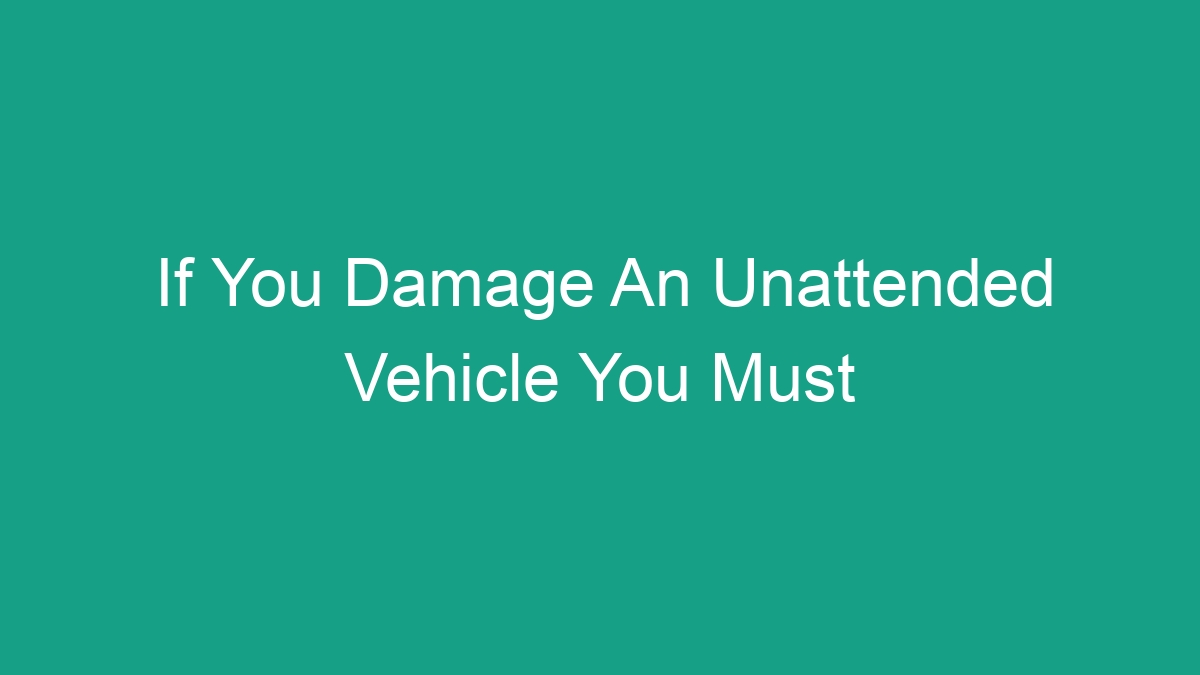
Introduction
When you accidentally damage an unattended vehicle, it can be a stressful and confusing situation. It’s essential to know the correct steps to take to handle the situation appropriately and avoid legal repercussions. This guide will provide you with a comprehensive overview of what to do if you damage an unattended vehicle, including your legal obligations, steps to take, and potential consequences.
Legal Obligations
1. Stop and Assess the Situation: If you accidentally damage an unattended vehicle, you are legally obligated to stop and assess the situation. Leaving the scene without stopping can result in serious legal consequences, including hit-and-run charges.
2. Locate the Owner: After stopping, make a reasonable effort to locate the owner of the damaged vehicle. This may involve asking nearby individuals if they know who the vehicle belongs to, leaving a note with your contact information on the damaged vehicle, or contacting local authorities for assistance.
3. Notify the Authorities: In some jurisdictions, you are required by law to report the accident to the police, especially if the damage is significant. Check local laws to determine if reporting the incident is mandatory.
Steps to Take
1. Take Photos: Before taking any further action, document the scene by taking photos of the damage to the unattended vehicle, your own vehicle, and the surrounding area. These photos may serve as crucial evidence if the situation escalates.
2. Exchange Information: If you are unable to locate the owner of the damaged vehicle, leave a note with your contact information and a brief explanation of the incident. Alternatively, if the owner is present, exchange contact and insurance information as you would in a traditional accident scenario.
3. Notify Your Insurance Company: Regardless of whether you are able to locate the owner of the damaged vehicle, it’s crucial to notify your insurance company of the incident. Your insurance provider can provide guidance on the next steps and may cover the cost of repairs to the other vehicle.
4. Seek Legal Advice: If the situation escalates, and you are facing legal challenges or demands for compensation from the owner of the damaged vehicle, seek legal advice from a qualified attorney. They can provide guidance on how to navigate the legal complexities of the situation.
Potential Consequences
1. Civil Liability: If you damage an unattended vehicle and fail to take the necessary steps to rectify the situation, you may be held civilly liable for the damages. This could result in a lawsuit and a legal obligation to compensate the owner for the cost of repairs.
2. Criminal Charges: Failing to stop, assess the situation, and report the accident may result in criminal charges, such as hit-and-run. Depending on the severity of the damage and the laws in your jurisdiction, you could face fines, license suspension, and even imprisonment.
3. Insurance Ramifications: Accidents involving unattended vehicles can impact your insurance premiums and coverage. Failing to report the incident to your insurance company could result in a denial of coverage for the damages.
4. Personal Repercussions: In addition to legal and financial consequences, causing damage to an unattended vehicle can also have personal repercussions. It can be a source of stress, guilt, and potential damage to your reputation.
Conclusion
Accidentally damaging an unattended vehicle is a situation that requires prompt and responsible action. By understanding your legal obligations, taking the necessary steps, and being aware of potential consequences, you can navigate this challenging scenario with integrity and minimize the risk of legal, financial, and personal repercussions.
Remember, always be proactive in addressing the situation, seek legal guidance if necessary, and work with your insurance company to ensure that the appropriate measures are taken. By doing so, you can mitigate the impact of the incident and demonstrate your commitment to handling the situation ethically and responsibly.


